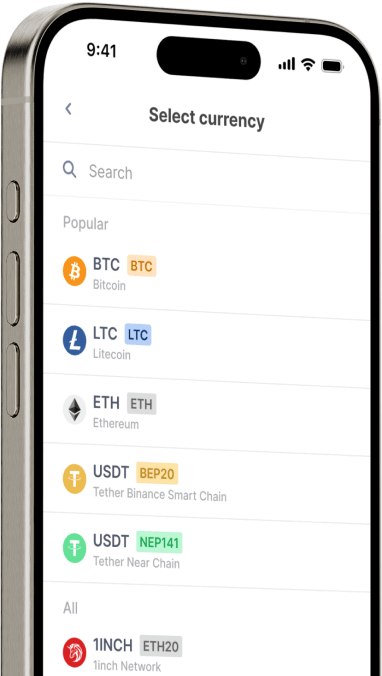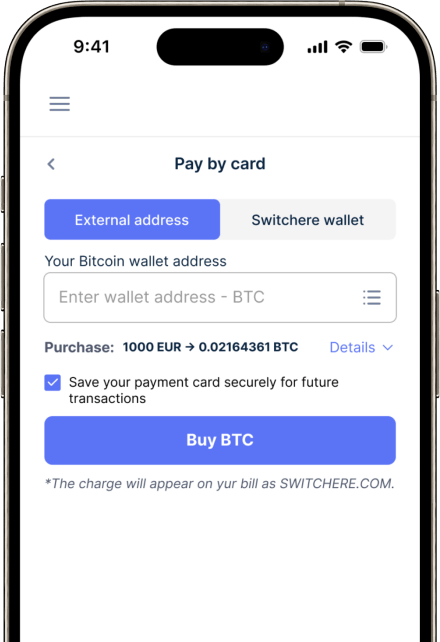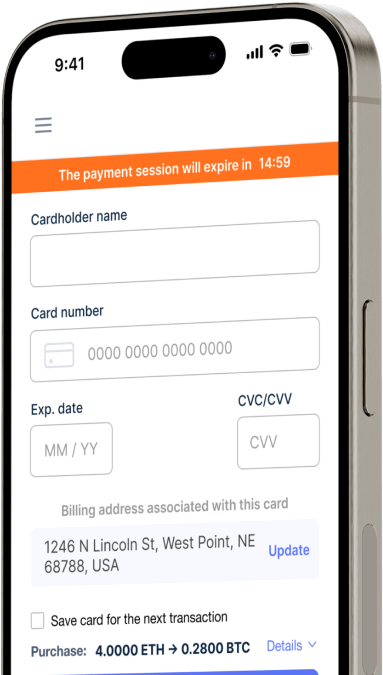Converter
Brazilian Real (BRL) em Binance USD (BUSD) instantaneamente
Compre Binance USD (BUSD) com Brazilian Real (BRL) facilmente na Switchere e beneficie-se de transações rápidas e seguras.
Sobre
Binance USD (BUSD)
O BUSD (BUSDBSC) é uma stablecoin regulamentada e lastreada em moeda fiduciária, atrelada ao dólar americano na proporção de 1:1, projetada para proporcionar estabilidade de preços no cenário volátil de ativos digitais. Emitida pela Paxos Trust Company em parceria com a Binance, a BUSD tem como objetivo oferecer um meio confiável de troca e reserva de valor. O ticker "BUSDBSC" denota especificamente sua presença como um token BEP-20 na BNB Smart Chain, uma rede descentralizada de alto desempenho que facilita aplicativos DeFi abrangentes. A tecnologia principal por trás do BUSD se baseia em reservas transparentes e auditadas de dólares americanos mantidas em contas dedicadas, garantindo que cada token seja respaldado por uma quantia equivalente de moeda fiduciária. Isso contrasta com as stablecoins algorítmicas, que oferecem uma abordagem diferente para manter sua indexação e segurança criptográfica.
A principal utilidade do BUSD, especialmente de sua variante BUSDBSC, é permitir transações contínuas e participação no ecossistema da BNB Chain com risco mínimo de preço. Sua tokenômica é simples: o novo BUSD é cunhado quando os dólares são depositados na Paxos e queimado quando resgatado, mantendo o lastro de 1:1. Casos de uso proeminentes incluem a negociação contra outras criptomoedas em bolsas como a PancakeSwap, servindo como garantia em protocolos de empréstimo e empréstimo, produção agrícola em vários aplicativos DeFi e facilitação de pagamentos peer-to-peer. Como uma stablecoin aprovada pelo NYDFS (para a versão Ethereum emitida pela Paxos) e amplamente adotada, a BUSD desempenha um papel significativo no fornecimento de liquidez e de uma representação confiável e compatível do dólar digital em várias plataformas de tecnologia de blockchain, atuando como um elemento fundamental para muitas infraestruturas Web3 e atividades financeiras na cadeia.
Compre outras 150+ criptomoedas por Brazilian Real (BRL)
Outras moedas para Brazilian Real (BRL)
-
BRL a ZRX
-
BRL a 1INCH
-
BRL a AAVE
-
BRL a ACH
-
BRL a ALGO
-
BRL a TLM
-
BRL a ANKR
-
BRL a APE
-
BRL a NFT
-
BRL a API3
-
BRL a APT
-
BRL a ARPA
-
BRL a AUDIO
-
BRL a AVAX
-
BRL a AVAX
-
BRL a AXS
-
BRL a BADGER
-
BRL a BAL
-
BRL a BNT
-
BRL a BAT
-
BRL a BNB
-
BRL a BUSD
-
BRL a BSW
-
BRL a BSV
-
BRL a BLUR
-
BRL a BONE
-
BRL a CTSI
-
BRL a CELR
-
BRL a CELO
-
BRL a CEL
-
BRL a LINK
-
BRL a CHZ
-
BRL a CHR
-
BRL a C98
-
BRL a COMP
-
BRL a CFX
-
BRL a PEOPLE
-
BRL a CVX
-
BRL a ATOM
-
BRL a CTC
-
BRL a CRV
-
BRL a DAI
-
BRL a DASH
-
BRL a MANA
-
BRL a DENT
-
BRL a DGB
-
BRL a LEASH
-
BRL a DYDX
-
BRL a XEC
-
BRL a EOS
-
BRL a ETC
-
BRL a ENS
-
BRL a ETHW
-
BRL a FET
-
BRL a FIL
-
BRL a FLOKI
-
BRL a GALA
-
BRL a GNO
-
BRL a ONE
-
BRL a HBAR
-
BRL a HOT
-
BRL a HOOK
-
BRL a ICX
-
BRL a ILV
-
BRL a IMX
-
BRL a INJ
-
BRL a ICP
-
BRL a IOST
-
BRL a IOTX
-
BRL a JASMY
-
BRL a JST
-
BRL a KAVA
-
BRL a KCS
-
BRL a KSM
-
BRL a KNC
-
BRL a LDO
-
BRL a LQTY
-
BRL a LPT
-
BRL a LOOKS
-
BRL a LRC
-
BRL a LUNA
-
BRL a MKR
-
BRL a MASK
-
BRL a EGLD
-
BRL a ALICE
-
BRL a NEAR
-
BRL a XEM
-
BRL a NEXO
-
BRL a NOT
-
BRL a NMR
-
BRL a OKB
-
BRL a OMG
-
BRL a ONT
-
BRL a EDU
-
BRL a OP
-
BRL a OGN
-
BRL a CAKE
-
BRL a PAXG
-
BRL a PENDLE
-
BRL a DOT
-
BRL a POL
-
BRL a QTUM
-
BRL a QNT
-
BRL a RDNT
-
BRL a XRD
-
BRL a RVN
-
BRL a REN
-
BRL a RSR
-
BRL a RLC
-
BRL a RPL
-
BRL a SFP
-
BRL a SHIB
-
BRL a SKL
-
BRL a SXP
-
BRL a STND
-
BRL a STG
-
BRL a XLM
-
BRL a GMT
-
BRL a STORJ
-
BRL a STMX
-
BRL a SUSHI
-
BRL a SNX
-
BRL a USDT (NEP141)
-
BRL a USDT (FA2)
-
BRL a USDT (TRC20)
-
BRL a USDT (JETTON)
-
BRL a USDT (SPL)
-
BRL a USDT (ERC20)
-
BRL a USDT (AVAC)
-
BRL a USDT (BEP20)
-
BRL a USDT (Polygon)
-
BRL a XTZ
-
BRL a GRT
-
BRL a SAND
-
BRL a TFUEL
-
BRL a THETA
-
BRL a RUNE
-
BRL a TON
-
BRL a TUSD (BEP20)
-
BRL a TUSD (TRC20)
-
BRL a TWT
-
BRL a UOS
-
BRL a UMA
-
BRL a UNI
-
BRL a USDC (SPL)
-
BRL a USDC (Polygon)
-
BRL a USDC (OP)
-
BRL a USDC (TRC20)
-
BRL a USDC (BEP20)
-
BRL a USDC (BEP20)
-
BRL a USDC (AVAC)
-
BRL a USDC (ARB)
-
BRL a USDC (ERC20)
-
BRL a VET
-
BRL a VRA
-
BRL a WAXP
-
BRL a WOO
-
BRL a WLD
-
BRL a WBTC
-
BRL a WMINIMA
-
BRL a XDC
-
BRL a YFI
-
BRL a YGG
-
BRL a ZIL
Como comprar Binance USD (BUSD)
Perguntas frequentes
-
Qual é a forma mais comum de converter Real Brasileiro (BRL) para Binance USD (BUSD)?
O método mais comum é usar uma corretora de criptomoedas que atende ao mercado brasileiro e oferece BRL como rampa de acesso fiduciária. Os usuários normalmente concluem a conformidade KYC/AML e, em seguida, depositam BRL via PIX ou transferência bancária (TED). Assim que o BRL é creditado, eles podem colocar uma ordem no mercado à vista BRL/BUSD para comprar a stablecoin BUSD.
-
Existem questões regulatórias que afetam o par de negociação BRL/BUSD?
Sim. Em fevereiro de 2023, o emissor Paxos foi ordenado pelo NYDFS a cessar a cunhagem de novos tokens BUSD. Embora o BUSD existente permaneça totalmente garantido e resgatável através da Paxos, nenhuma nova oferta está sendo criada. Esta ação regulatória levou muitas corretoras a remover ou reduzir o suporte para pares BUSD. Os traders devem estar cientes desta situação, pois ela impacta a liquidez e viabilidade a longo prazo do BUSD como ativo digital.
-
Como posso armazenar meu BUSD de forma segura após uma transação com BRL?
Para segurança ideal, você deve transferir seu BUSD da corretora de criptomoedas para uma carteira digital não custodial, onde você controla as chaves privadas. Dependendo da versão da blockchain do seu BUSD, você pode usar uma carteira compatível com Ethereum (para ERC-20) ou uma carteira compatível com a BNB Smart Chain (para BEP-20). As carteiras de hardware oferecem o mais alto nível de segurança para o armazenamento de longo prazo dos seus ativos digitais.
-
O que é o Binance USD (BUSD) e qual a sua base técnica?
O Binance USD (BUSD) é uma stablecoin atrelada em 1:1 ao dólar americano. Foi emitido pela Paxos e aprovado pelo Departamento de Serviços Financeiros do Estado de Nova York (NYDFS). Tecnicamente, o BUSD existe como um token digital em várias blockchains, mais notavelmente como um token ERC-20 na Ethereum e um token BEP-20 na BNB Smart Chain, garantindo ampla compatibilidade com carteiras digitais e dApps.
-
Quais tipos de taxas estão envolvidas ao usar BRL para comprar BUSD?
Existem várias taxas potenciais. Primeiro, uma taxa de depósito para BRL, embora muitas corretoras ofereçam depósitos gratuitos via PIX. Segundo, uma taxa de negociação no livro de ofertas da corretora, geralmente uma pequena porcentagem do valor da transação. Finalmente, se você sacar o BUSD para uma carteira digital externa, será aplicada uma taxa de rede da blockchain (ou 'taxa de gás'), que varia dependendo se você o saca como um token ERC-20 (Ethereum) ou BEP-20 (BNB Chain).
-
Por que um trader no Brasil escolheria o par BRL/BUSD em vez de BRL/USDT?
Historicamente, alguns traders preferiam o BUSD devido à sua supervisão regulatória pelo NYDFS e ao seu emissor, a Paxos, ser uma empresa fiduciária regulamentada nos EUA, o que era percebido como oferecendo maior transparência e garantia de lastro do que os concorrentes. Além disso, estava profundamente integrado ao ecossistema da Binance, muitas vezes com taxas de negociação mais baixas. No entanto, dada a interrupção na emissão de BUSD, muitos traders agora priorizam a maior liquidez e a aceitação mais ampla do mercado do USDT.




